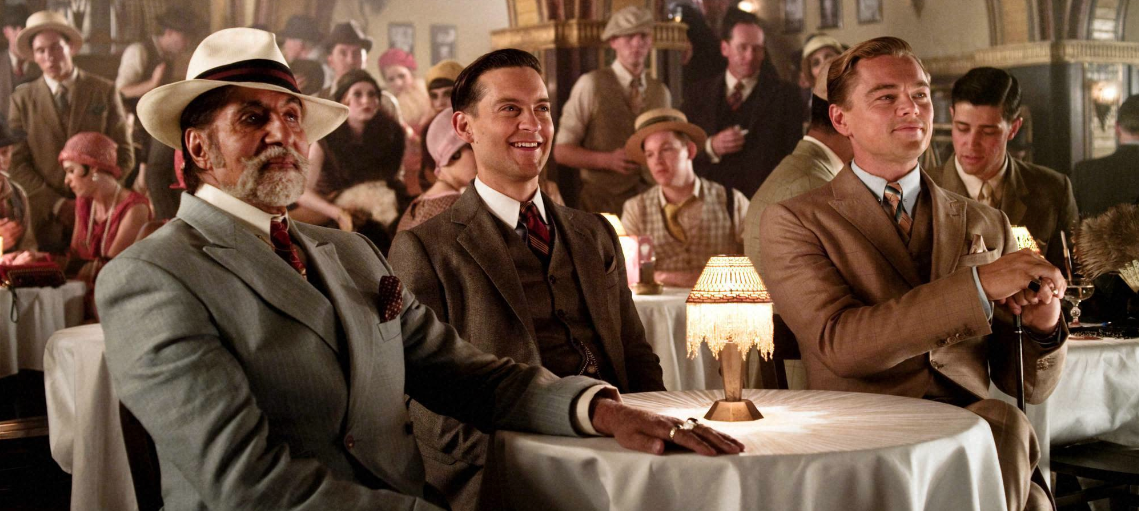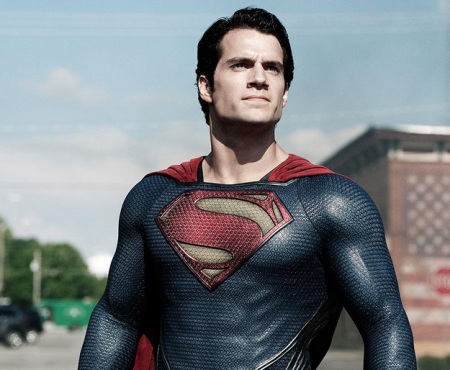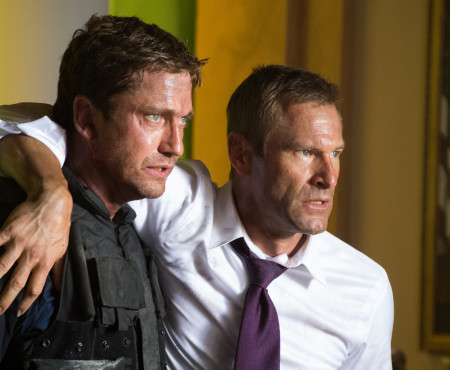There have been many “In Defense Of” pieces about The Great Gatsby over the last year. Baz Luhrmann’s extravagant adaptation of the F. Scott Fitzgerald novel was initially condemned for the simple sin of being too much: too much hip-hop music and Lana del Rey, too much green-screening and post-production ornamentation. Too much excess, period. Then some came out to declare a kind of ironic love for the sheer spectacle of it all. Somehow, the intricately chaotic party scenes replete with half-naked girls and stray zebras, the black flappers dancing to ‘Izzo’ on the Brooklyn Bridge, Amitabh Bachchan’s impressive facial hair, were all part of the movie’s inherent, ridiculous charm.
What’s fascinating is that Moulin Rouge is considered Luhrmann’s masterpiece when it is everything Gatsby has been unfairly criticized for: needlessly over-the-top, chock full of obnoxious and uninteresting characters. But while viewing Gatsby as a kind of novelty may be tempting, there is, I’d venture, some good filmmaking at work behind all the glitter and the gold. Gatsby is not a great movie in spite of its spectacle. Appreciation and reconsideration of this film need not be conditional.
It’s in Gatsby where Luhrmann has really honed the directorial idiosyncrasies we see in Strictly Dancing, Romeo + Juliet, and Moulin Rouge. With Gatsby, Luhrmann has actually shown a surprising amount of restraint, slowing down the pace of his storytelling to offer quiet moments like the tea party scene which, contrary to a popular internet meme, does not have “rap music playing softly in the background,” but instead utilizes silence for one of the more emotionally engaging points in the film.
Now of course one could defend point by point the major criticisms of this movie, such as the soundtrack. Luhrmann is a director who’s obsessed with pop culture, with pop songs and Coca Cola and all things modern, and its a quality that’s actually well-matched to the material. With Gatsby, the hip hop soundtrack is a kind of inspired answer to the energy, immediacy and cool-factor of jazz music in the 1920s, highlighting the connections between black culture, black music and the lifestyles of the rich and white.
One could also point out that Luhrmann’s take on the Gatsby story is a very faithful adaptation, truer to the source material’s evocative passages than the inexplicably beloved Robert Redford version (Gatsby’s entrance in Luhrmann’s movie alone trumps everything the Redford adaptation chooses to do with Fitzgerald’s text). His party set pieces match the opulence of descriptions like: “Champagne was served in glasses bigger than finger bowls.” The constant presence of the green light at the end of the dock emphasizes the visual metaphor that’s mentioned almost obsessively in the novel.
But the real reason The Great Gatsby deserves another chance is this: Gatsby is one of Leonardo DiCaprio’s most fascinating performances in years.
DiCaprio is one of the great actors of his generation, but unlike the freedom and unpretentiousness we see in male performers such as Joaquin Phoenix, the wheels turning furiously in his mind are always on display. You see him act. Since The Aviator he’s given some wonderful, but far too calculated performances. Even his choices in roles have been far too calculated. Now of course, this year, there is Jordan Belfort. Undeniably a great role, undeniably a great performance. It’s the kind of role we like to see Leo play. Those fast-talking, Oscar-baiting parts which he really excels in – the rise-and-fall stories that give him the opportunity to chew up scenery and soliloquize and make himself the centerpiece.
With Gatsby though, things are different, and watching DiCaprio navigate a cinematic environment vastly different than what we’re used to seeing him is thrilling. Juxtaposed with the excess and artifice is a performance from the 39-year-old actor that is surprising in its understatedness. Save for the blowout with Tom Buchanan, the car ride into Manhattan, rarely does DiCaprio outshine his surroundings. And yet, he exudes a charm we haven’t seen in a while. We don’t actually meet him until fifteen minutes into the movie, and when we do, watching him raise his glass to Nick Carraway as ‘Rhapsody in Blue’ swells and fireworks go off, is one of the greatest shots of 2013.
The bottom line is that it’s been a long time since we’ve seen DiCaprio play a character like Jay Gatsby, the way he plays Jay Gatsby. It’s the earnestness with which DiCaprio plays Gatsby, his most earnest performance in years, that makes him so interesting in the role. It’s the conviction with which he says, “Old sport,” for the umpteenth time, or the expression on his face when he responds to Carraway’s “You can’t relive the past,” with, “Oh… but you can.” For such a tragic figure, the sense of lightness that DiCaprio brings to the part is a refreshing, unexpected acting choice.
There’s this profound sense of naivete and, as Tobey MaGuire’s Nick Carraway points out, hope that’s lacking in Hoover, in Candie, in Hobb, in Belfort. This isn’t to say that it’s better, it’s just different, and sometimes seeing an actor do something different can be more exciting than seeing them excel in something familiar.





















4 thoughts on “For Your Reconsideration: ‘The Great Gatsby’”
I liked that film. I knew it was going to be a mindless spectacle but it was so fun to watch. Plus, Leo is so great in that film. I could watch him be a smug old sport.
Great piece. Just one thing, though. My piece was linked in a sentence talking about people ironically loving the spectacle, which isn’t my view at all. I seriously think The Great Gatsby is a great movie, and my piece featured an analysis of the film’s expert use of 3D to accentuate the thematic meaning of the film’s more spectacular sequences.
My fault. Your piece was supposed to be linked to a different sentence.
This is some nice thinking. I only saw it the one time, the weekend it came out, but I felt like it did a great job reflecting in style what’s reflected in the story: emptiness, phoniness, gaudiness, excess. The material is a perfect match for Baz’s style, even though I didn’t agree with his approach to every single moment. Is the Redford version beloved? I think it just might be because it was the only adaptation around, until now. That movie is a snoozefest, so staid and Redford seems to have no concept of who Gatsby is. I legitimately loved Leo’s performance, showing the chinks in the persona, a character who barely knows who he is because he’s been playing a part for so long. Good stuff.